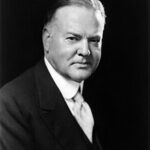The Decision Against Direct Aid
President Herbert Hoover firmly rejected direct federal relief programs during America’s worst economic crisis. His administration consistently opposed unemployment benefits and food assistance programs. Hoover believed federal welfare would destroy American self-reliance and individual responsibility. The president maintained this position even as unemployment reached 25 percent nationwide 📊.
Philosophy Behind the Rejection
Hoover’s opposition to federal relief stemmed from his core political beliefs. He argued that government assistance would create permanent dependency among citizens. The president believed local communities and private charities should handle relief efforts. This approach reflected traditional American values of individualism and limited government intervention ⚠️.
The Growing Crisis
By 1931, private charities became completely overwhelmed by massive demand for assistance. Local governments lacked resources to provide adequate relief to millions of unemployed families. Breadlines stretched for blocks in major cities across the nation. Despite mounting evidence of widespread suffering, Hoover federal relief policies remained unchanged. The president continued promoting voluntary cooperation over direct government assistance 💰.
Impact:
Immediate Human Consequences
Millions of Americans faced starvation and homelessness without federal assistance programs. Families lost their homes and life savings while waiting for private charity help. Children suffered from malnutrition as parents struggled to find basic necessities. Unemployment lines grew longer while relief resources dwindled rapidly. The human cost of rejecting Hoover federal relief became devastatingly clear 📉.
Political Fallout
Hoover’s stance destroyed his political reputation and credibility with American voters. Democrats successfully portrayed him as heartless and out of touch with suffering citizens. The 1932 election became a referendum on his failed relief policies. Republicans lost control of Congress and the presidency decisively. Hoover’s name became synonymous with government indifference during national crisis 🔥.
Long-term Policy Changes
Franklin Roosevelt’s New Deal directly reversed Hoover’s approach to federal relief programs. The Social Security Act and unemployment insurance became permanent government responsibilities. Federal welfare programs expanded dramatically under Democratic leadership after 1933. Hoover’s rejection established a clear contrast between conservative and liberal approaches. Modern social safety nets emerged as direct responses to his policy failures 🌍.
